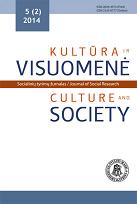Į(si)traukimas į socialinių paslaugų sistemą: nakvynės namų gyventojų ir socialinių paslaugų įstaigų darbuotojų požiūris
(Self-)involvement in the social service system: attitudes of the residents of homeless shelters and of the staff at social service institutions
Author(s): Rasa IndriliūnaitėPublished by: Vytauto Didžiojo Universitetas
Keywords: Neoliberali socialinė gerovė; Socialinės paslaugos; „Institucinė grandinė“; Nakvynės namai; Benamiai; Neo-liberal social welfare; Social services; “Institutional circuit”; Homeless shelter; Homeless
Summary/Abstract: Neoliberaliai gerovės politikai formuojant priklausomo nuo gerovės sistemos paramos gavėjo sampratą augantis paramos gavėjų skaičius, didėjanti tokios priklausomybės trukmė skatina diskutuoti apie „priklausomybės nuo paramos“ kultūrą ir dalies visuomenės narių patekimą į vadinamąją „institucinę grandinę“ (Metraux, Culhane 2006). Ši „institucinė grandinė“ palaikoma pačios gerovės sistemos ir jos struktūrinių dalių. Individų priklausomybė nuo tos sistemos pasireiškia jiems adaptuojant gerovės institucijų siūlomą tvarką ir taisykles. Socialiniam teisingumui visuomenėje palaikyti neoliberalioje gerovės valstybėje reikšmingos pasidarė įvairios socialinės kontrolės formos, marginalumo asimiliacijos ir deviacijos maskavimo praktikos. Nakvynės namai būsto neturintiems asmenims taip pat gali būti traktuojami kaip prevencinis mechanizmas, leidžiantis absorbuoti tariamas potencialias jais besinaudojančių asmenų grupės keliamas grėsmes. Straipsnyje siekiama atskleisti asmens įsitraukimo į gerovės valstybės paramos instituciją būdus, analizuojant vienos iš šių institucijų – nakvynės namų benamiams asmenims – gyventojų santykio su įvairiomis gerovės sistemos institucijomis ir jų darbuotojais patirtis. Nakvynės namų gyventojų patirtys iliustruojamos socialinės srities darbuotojų vertinimais, kuriais siekiama identifikuoti asmens prisitaikymo institucijoje veiksnius ir praktikas bei jų, kaip šios srities ekspertų, požiūrį į pačios institucijos vaidmenį, įtraukiant ir sukuriant priklausomybę nuo institucinės paramos. With neo-liberal welfare policy developing the concept of a beneficiary dependent on the welfare system, the growing number of such persons and the increasing duration of their dependency prompt a discussion about the “culture of welfare dependency” and so-called “institutional circuit” that a part of society members fall into (Metraux, Culhane 2006). The welfare system itself and its structural parts maintain this “institutional circuit.” Individuals become dependent on the welfare state by adapting to the procedures and rules of welfare institutions and remaining within this system for a long time. Furthermore, different forms of social control, marginalization, assimilation and deviation became important in maintaining social justice in the neo-liberal welfare state. A homeless shelter can also be treated as a preventative mechanism allowing the absorption of potential threats posed by the people using its services. Focusing on the ways of persons’ involvement in Lithuanian homeless shelters, the article analyzes the experiences of their residents, and the relationship between the homeless, different institutions of welfare state and their staff. The focus group interview with social workers and semi-structured interviews with male residents of the homeless shelters enable to identify factors and practices that make them develop dependency on institutional welfare.
Journal: Kultūra ir visuomenė: socialinių tyrimų žurnalas
- Issue Year: V/2014
- Issue No: 2
- Page Range: 105-127
- Page Count: 23

